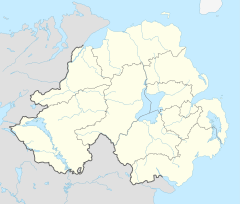Brougher Mountain transmitting station
 Brougher Mountain transmitting station | |
| Tower height | 55 metres (180 ft) |
|---|---|
| Coordinates | 54°25′24″N 7°27′38″W / 54.42327°N 7.46043°W |
| BBC region | BBC Northern Ireland |
| ITV region | UTV |
| Local TV service | NVTV [dubious – discuss] |
Brougher Mountain transmitting station is a major transmitting station in Northern Ireland.[1][2] It is located between County Tyrone and County Fermanagh, on top of a 317 m (1,040 ft) high hill called Brougher Mountain.[3]
It has four other transmitter sites in its digital television transmitter group, at Ederny, Derrygonnelly, Belcoo, and Lisbellaw.[4]
Brougher Mountain came into service on 24 February 1964, transmitting the BBC Television Service on VHF 405 lines.
The ITV service provided by Ulster Television launched from the Strabane transmitter located 40 miles north of Brougher Mountain on 18 February 1963 and its coverage extended down to the area covered by Brougher Mountain. prior to date the only television service available in many parts of its service area was from Telefís Éireann's Truskmore transmitter which opened in 1962.
It became the main UHF transmitter for the area in July 1978, when BBC One, BBC Two and UTV started transmitting in colour on the 625 line UHF service. The last main transmitting station in the UK to be equipped for UHF. Channel 4 started transmitting from the transmitter in December 1983.[5][6][7]
Due to its close proximity to the Republic of Ireland, since the transmitter went on air in 1964, many living in counties Cavan, Monaghan, Donegal, Leitrim, Roscommon and Sligo could receive the UK channels via spill-over signals from Brougher Mountain, as well as the Strabane transmitter.
During the mid-1980s Brougher Mountain was the only of the original BBC main FM transmitters in Northern Ireland affected by the frequency changes arising from the 1984 Geneva (FM) Frequency plan with all (then) three services moving up 0.5 MHz although across the border in the Republic of Ireland the RTE's FM transmitter network were more extensively affected.
The site was the location of an Provisional IRA bombing on the 9th February 1971, which left 5 BBC workers dead when their vehicle was destroyed by a landmine. The workers were travelling up the mountain to repair the transmitter when the landmine, which was detonated by a tripwire, detonated. It has been suggested that the booby trap was in fact set to target members of the British Army, who regularly patrolled in the border area.
Services transmitted by frequency
[edit]Analogue radio
[edit]| Frequency | kW | Service | Notes |
|---|---|---|---|
| 89.4 MHz | 5 | BBC Radio 2 | 88.9 MHz Prior to c.1985 |
| 91.6 MHz | 5 | BBC Radio 3 | 91.1 MHz Prior to c.1985 |
| 93.8 MHz | 5 | BBC Radio Ulster | 93.3 MHz Prior to c.1985 |
| 95.6 MHz | 5 | BBC Radio 4 | Since 1993 |
| 96.6 MHz | 5 | Downtown Radio | Since 1987 |
| 99.0 MHz | 5 | BBC Radio 1 | Since 1993 |
| 101.2 MHz | Q Radio Tyrone & Fermanagh | Since 2006 |
Digital radio
[edit]| Frequency | Block | kW | Operator |
|---|---|---|---|
| 225.648 MHz | 12B | 3.2 | BBC National DAB |
| 229.072 MHz | 12D | 4.35 | Bauer Northern Ireland |
Digital television[edit]Including Sept 2019 Frequency changes.
|
Before switchover[edit]
|
Analogue television (before 24 October 2012)
[edit]| Frequency | UHF | kW | Service |
|---|---|---|---|
| 479.25 MHz | 22 | 100 | BBC One Northern Ireland |
| 503.25 MHz | 25 | 100 | UTV |
| 527.25 MHz | 28 | 100 | BBC Two Northern Ireland |
| 559.25 MHz | 32 | 100 | Channel 4 |
See also
[edit]References
[edit]- ^ VisualServ. "Brougher Mountain Transmitting Station". geograph.org.uk. Retrieved 17 April 2011.
- ^ Mike Brown. "Transmission Information - Brougher Mountain". Archived from the original on 2 June 2009. Retrieved 17 April 2011.
- ^ "Brougher Mountain Hill". Retrieved 17 April 2011.
- ^ "Northern Ireland TV region: Digital Switchover transmission groups" (PDF). Ofcom. July 2009. Retrieved 17 April 2011.
- ^ "405 Alive - Information - A List of VHF 405-Line Transmitters".
- ^ "When did the aerial groups change ? - Page 3". 23 January 2010.
- ^ Transmitting aerials for the Enniskillen v.h.f. television and v.h.f. sound station | TECHNOLOGICAL REPORT No. E-101 (1964/21) (PDF) (Report). 1964.

